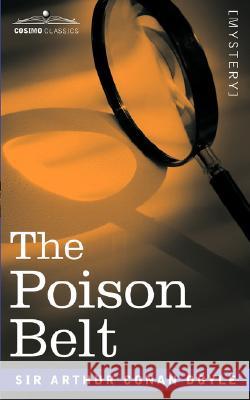The Poison Belt » książka
The Poison Belt
ISBN-13: 9781605201146 / Angielski / Miękka / 2008 / 124 str.
The Poison Belt
ISBN-13: 9781605201146 / Angielski / Miękka / 2008 / 124 str.
(netto: 53,39 VAT: 5%)
Najniższa cena z 30 dni: 55,30
ok. 16-18 dni roboczych.
Darmowa dostawa!
Though best remembered for his creation of the world's first consulting detective, Sir Arthur Conan Doyle is also the literary father of the jack-of-all-sciences Professor Challenger, a forerunner of such modern-day adventure heroes as MacGyver and Doctor Who. In this 1913 novel, a followup to Challenger's first adventure in Conan Doyle's dinosaur escapade The Lost World, the professor and his team-Professor Summerlee, adventurer Lord John Roxton, and reporter Ed Malone-must contend with the very end of the world itself as planet Earth moves through a deadly region of space dense with poisonous ether. Fans of adventure drama and early science fiction will thrill to this forgotten classic from one of the pioneers of pulp fiction. Scottish surgeon and political activist SIR ARTHUR CONAN DOYLE (1859-1930) turned his passions into stories and novels, producing fiction and nonfiction works sometimes controversial (The Great Boer War, 1900), sometimes fanciful (The Coming of the Fairies, 1922), and sometimes legendary (The Adventures of Sherlock Holmes, 1892).
Though best remembered for his creation of the worlds first consulting detective, Sir Arthur Conan Doyle is also the literary father of the jack-of-all-sciences Professor Challenger, a forerunner of such modern-day adventure heroes as MacGyver and Doctor Who.In this 1913 novel, a followup to Challengers first adventure in Conan Doyles dinosaur escapade The Lost World, the professor and his team-Professor Summerlee, adventurer Lord John Roxton, and reporter Ed Malone-must contend with the very end of the world itself as planet Earth moves through a deadly region of space dense with poisonous ether.Fans of adventure drama and early science fiction will thrill to this forgotten classic from one of the pioneers of pulp fiction.Scottish surgeon and political activist SIR ARTHUR CONAN DOYLE (1859-1930) turned his passions into stories and novels, producing fiction and nonfiction works sometimes controversial (The Great Boer War, 1900), sometimes fanciful (The Coming of the Fairies, 1922), and sometimes legendary (The Adventures of Sherlock Holmes, 1892).











